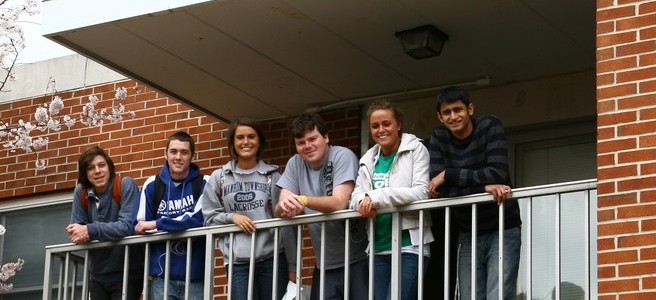 Have you ever thought about living in a STEM dorm, or offering an embedded librarian service in one? A 2012 study published in The Journal of Higher Education (DOI: 10.1353/jhe.2012.0017) suggests that librarians could contribute to STEM retention through participation in field-specific residential programs, also known as living-learning (LL) programs.
Soldner et al. surveyed 5240 students who were living in residential halls at 46 universities across the country; about 37 percent of them lived in STEM LL dorms, intended for students who plan to major in a STEM discipline. The participants were all first year students in their second semester at the time of the survey. The researchers found a positive, although indirect, relationship between participation in a STEM LL program and a student’s self-reported likelihood of completing a STEM degree (p. 325). According to the researchers’ model, a LL program increases social support for undergraduates, which in turn improves self-efficacy, known to be positively correlated with retention.
Alright, so living in a student dorm isn’t your cup of tea. How else could a librarian become involved in a STEM residential community? One approach is holding reference hours in a dorm, which many librarians are doing already. It’s likely that if asked, a STEM LL program would be thrilled to have a librarian make weekly visits to a dorm. LL dorms also tend to provide informational sessions for students and again would likely welcome a presentation by a STEM librarian. Basically, anything you can do to let the students know you support them and are rooting for them to be successful will get them down the road to a STEM degree.
Image attribution: York College of PA, Mini Dorms, 2009. Licensed through Creative Commons.
Have you ever thought about living in a STEM dorm, or offering an embedded librarian service in one? A 2012 study published in The Journal of Higher Education (DOI: 10.1353/jhe.2012.0017) suggests that librarians could contribute to STEM retention through participation in field-specific residential programs, also known as living-learning (LL) programs.
Soldner et al. surveyed 5240 students who were living in residential halls at 46 universities across the country; about 37 percent of them lived in STEM LL dorms, intended for students who plan to major in a STEM discipline. The participants were all first year students in their second semester at the time of the survey. The researchers found a positive, although indirect, relationship between participation in a STEM LL program and a student’s self-reported likelihood of completing a STEM degree (p. 325). According to the researchers’ model, a LL program increases social support for undergraduates, which in turn improves self-efficacy, known to be positively correlated with retention.
Alright, so living in a student dorm isn’t your cup of tea. How else could a librarian become involved in a STEM residential community? One approach is holding reference hours in a dorm, which many librarians are doing already. It’s likely that if asked, a STEM LL program would be thrilled to have a librarian make weekly visits to a dorm. LL dorms also tend to provide informational sessions for students and again would likely welcome a presentation by a STEM librarian. Basically, anything you can do to let the students know you support them and are rooting for them to be successful will get them down the road to a STEM degree.
Image attribution: York College of PA, Mini Dorms, 2009. Licensed through Creative Commons.
Related


Leave a Reply